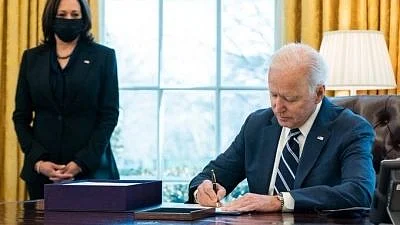A month after India announced the 'Digital Rupee' and imposed a 30 percent tax on digital assets, United States President Joe Biden has signed a much-awaited executive order regarding cryptocurrencies and the development of a possible 'Digital Dollar'.
The order outlines a "whole-of-government approach" to address the risks and harness the potential benefits of digital assets and their underlying technology, like encryption and blockchain.
"Digital assets, including cryptocurrencies, have seen explosive growth in recent years, surpassing a $3 trillion market cap last November," the White House said in a fact sheet.
"Surveys suggest that around 16 percent of adult Americans – approximately 40 million people – have invested in, traded, or used cryptocurrencies. Over 100 countries are exploring or piloting central bank digital currencies (CBDCs), a digital form of a country’s sovereign currency," it added.
The US says it wants to maintain technological leadership in the rapidly growing space of cryptocurrencies, support innovation, and mitigate the risks for consumers, businesses, the broader financial system, and the climate.
What the Order Says
The order lays out a national policy for digital assets across six key priorities:
Consumer and investor protection: The US Treasury will need to assess and develop policy recommendations around digital assets and safeguard against any systemic financial risks. This is especially important since crypto scams and cyber attacks are on the rise.
For instance, on 25 February, a United States jury officially charged the founder of BitConnect, India's Satish Kumbhani, with orchestrating a global Ponzi scheme. Kumbhani is on the run.
Financial stability: The Financial Stability Oversight Council has been told to identify and mitigate economy-wide financial risks posed by digital assets and to develop appropriate policy recommendations to address any regulatory gaps.
Illicit finance: Biden wants coordinated action across all relevant US government agencies to mitigate illicit finance and national security risks posed by digital assets. He also wants agencies to cooperate with allies and partners and leverage international frameworks, capabilities, and partnerships.
Last month, the US arrested a couple for allegedly trying to launder roughly $4.5 billion worth of stolen Bitcoins. There are also concerns that Russia and targeted individuals might try to sidestep sanctions using cryptocurrencies.
US leadership and economic competitiveness: The Department of Commerce has been directed to work across the government in establishing a framework to drive US competitiveness and leadership in, and leveraging of digital asset technologies.
Financial inclusion: The Secretary of the Treasury will produce a report on the future of money and payment systems related to digital assets and how they can be accessed by people safely and affordably.
Responsible innovation: Biden wants the US government to take concrete steps to study and support the responsible use and development of technological advances in digital asset systems, prioritising privacy, security, combating exploitation, and reducing negative climate impacts.
The massive electricity requirements in mining cryptocurrency, and the carbon footprint it generates, has been a major point of concern when it comes to the widespread adoption of cryptocurrency.
Apart from these six priorities, the order also directs the US government to look into whether there's a need for a potential US CBDC (a digital dollar) and assess the technological infrastructure and capacity needs for it.
Move Met With Applause
The language of the executive order sounds promising to crypto enthusiasts. With the use of phrases like "supporting innovation" the Biden administration seems to be legitimising the place of digital assets and cryptocurrency in the country's financial landscape.
While much remains to be done, there's widespread optimism.
"The crypto market is loving the White House Executive Order on crypto," wrote Bitcoin investor Cameron Winklevoss on Twitter.
“This is a watershed moment for crypto, digital assets, and Web 3, akin to the 1996/1997 whole of government wakeup to the commercial internet.”Jeremy Allaire, CEO of crypto platform Circle, on Twitter
"Like many of you, I thought the Biden Admin’s EO would acknowledge crypto, but not detail specifics on next steps for regulation. However, I was pleasantly surprised and inspired by the EO acknowledging the need for evolution and alignment of the government’s approach to crypto," wrote Brad Garlinghouse, CEO of Ripple, a crypto payments protocol.
(At The Quint, we question everything. Play an active role in shaping our journalism by becoming a member today.)
